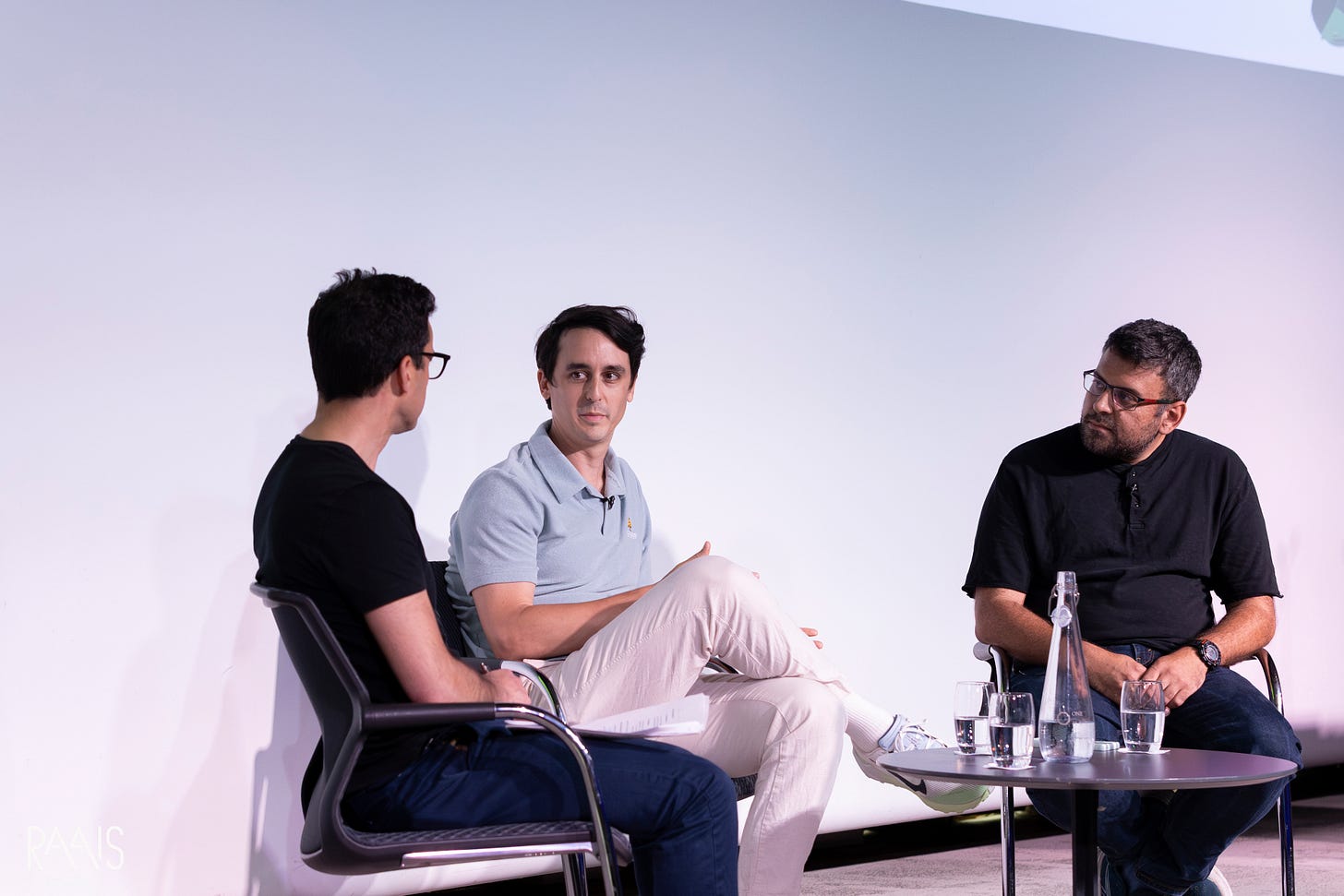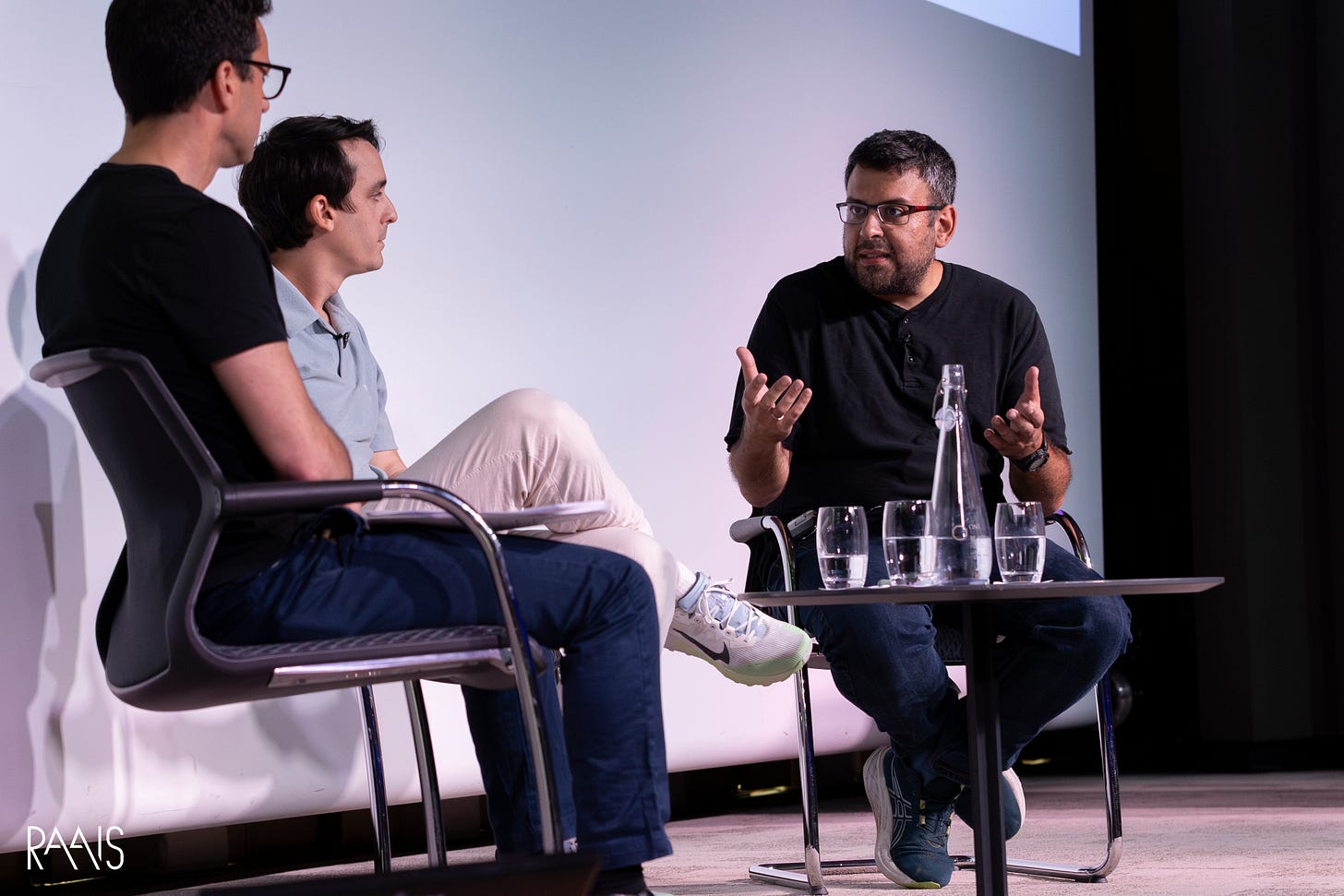What comes after the peace dividend
A conversation between Adam Satariano (New York Times), Dimitrios Kottas (Delian Alliance Industries) and Nathan Benaich (Air Street Capital) at RAAIS 2025.
At this year’s RAAIS, I joined Adam Satariano of the New York Times and Dimitrios Kottas, founder of Delian Alliance Industries and formerly Apple's Special Projects Group, for a candid conversation about one of the most taboo, yet increasingly urgent topics in tech: AI and defense.
The timing couldn’t be more acute. The war in Ukraine has shown how low-cost drones and software can upend conventional military doctrine. More recently, the escalation of hostilities with Iran has further underscored the volatility of global security and the growing relevance of digital warfare and drone-enabled asymmetric tactics. In the U.S., a second Trump administration has accelerated European defense policy, with Germany, Poland, France, and others pushing military spending to levels unseen since the Cold War. The European Commission plans to deploy €800 billion toward defense by 2029.
So: where does that money go? For once, not just to the legacy primes. There’s an opening for new entrants, namely startups building fast, iterating with operational focus, and pushing beyond the traditional defense hardware playbook.
From Silicon Valley to the battlefield
Dimitrios’s story is instructive. He left the relative safety of Cupertino’s R&D labs to build from scratch in Athens and London, grounded in robotics and autonomy. Why the shift?
“Because the genie is out of the bottle,” he said. “Revisionist powers are deploying lethal autonomous systems at scale with no moral reservations. Trying to argue about the ethics of putting a missile on a drone while your adversary is mass-producing them is a dead-end debate.”
He saw what many in the West ignored: how new technologies obliterated conventional forces in the Armenia-Azerbaijan war, particularly during the 2020 Nagorno-Karabakh conflict. The lesson? Defense is no longer just about steel and soldier count. It’s about software, autonomy, rapid manufacturing and robust supply chains. And unless liberal democracies catch up, we risk strategic irrelevance.
What changed for me
Like many in tech, I grew up in the era of “technology must not be be evil.” Defense was taboo: socially radioactive, professionally off-limits. But that's intellectually lazy.
Living in Europe and the US showed me just how uneven societies are in valuing their armed forces. In the U.S., defense is part of civic life. In Europe, it’s often invisible. That disconnect is dangerous. The freedoms we enjoy, such our ability to build companies, argue about politics, live openly, are underwritten by national defense.
And in a world where AI is being absorbed into geopolitical competition, the stakes are only rising. If I can’t build these systems myself, I can at least help the people who can.
Autonomy: the battlefield’s next interface
As Dimitrios explained, two trends dominate the AI-defense nexus:
Sensor fusion at scale: Modern battlefields are saturated with pixels. Drones, smartphones, cameras. The challenge is connecting them all, i.e. “any sensor to any effector”, through a central brain.
Operating in denied environments: Communications will fail. Autonomy is the only answer. Systems must navigate, patrol, identify targets, and ask for permission to engage all without persistent links.
We’re still in the early innings. Teleoperation dominates today, much like lane-assist dominated early self-driving. But the direction is clear: militaries want Level 5 autonomy. The tech curve is steep, and the next decade will define winners.
The opportunity and challenge for new entrants
For all the urgency, startups face brutal friction. Defense procurement remains built for peace: bureaucratic, risk-averse, captured by incumbents. European tenders often require three years of prior revenue with the ministry, which is a catch-22 for any new entrant.
And unlike SaaS, defense AI isn’t just about code. “You need hardware, ops, training, and integration,” Dimitrios said. “Software alone is irrelevant if it’s not actionable in the field.”
That’s where investors come in. Historically, it’s been hard to make money in defense. The post-war peace dividend led to consolidation, leaving only a few primes. But that’s changing. Private equity is moving in. Governments are becoming more startup-friendly. If software is eating the battlefield, the first forks are in.
My bet is that we’ll see a biotech-style model emerge: small, fast-moving defense companies take on early risk; primes acquire them to scale. Some startups, Delian among them, have the chance to grow into new proto-primes. The capital and technical stack required is daunting, but the prize is a defensible, strategically critical foothold in the future of geopolitics.
What we need today
So what do liberal democracies need to prioritize?
GPS-denied autonomy: Spoofing is real. Eastern flanks are already in blackout. We need computer vision systems that can localize without satellite access, think self-driving tech for war zones.
Maritime autonomy: Aerial autonomy has advanced rapidly, but oceans remain under-resourced. Electromagnetic silence makes navigation tricky. We need breakthroughs here.
Resilient supply chains: Defense startups must manufacture. But supply chains designed for peace are brittle. Who’s your parts supplier when your neighbor becomes your adversary?
And beyond tech, we need better policy: open procurement, mandated non-prime spending, clearer export rules, and startup-friendly funding mechanisms.
A call to action
To founders: if you're building frontier AI, this is your Manhattan Project moment.
To investors: the risk is real, but so is the reward, and not just financially. You're backing freedom.
To policymakers: align incentives. Streamline buying. Fund moonshots. Defense is a public good, treat it like one.
To skeptics: pacifism isn’t a strategy when adversaries build kill chains. The most unethical path is inaction.
The future of warfare won’t wait. The West must move fast, or others will move faster.





